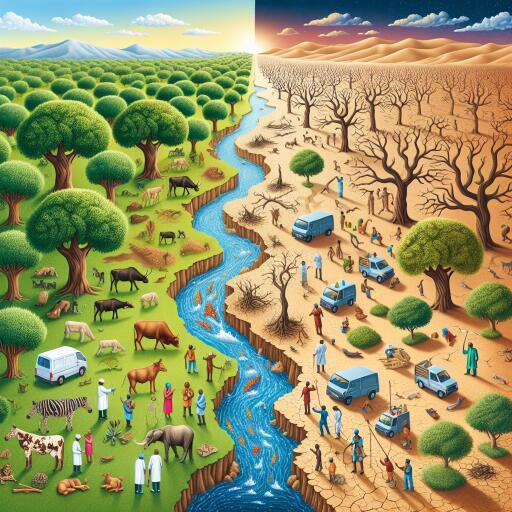
Editorial: The Growing Danger of Desertification
Desertification stands as one of the foremost environmental dilemmas of our era, its severity magnified under the looming shadow of climate change. This degradation of once fertile land into arid desert is often misunderstood as a mere expansion of existing deserts, but it roots deeper into human activities, accelerated by the harsh extremities of weather such as droughts and heavy precipitation – both symptoms of the global climate crisis.
In parts of the Mediterranean, the alarm bells ring louder with reports that one-third of the territory is battling land degradation. This situation paints a grim picture, particularly for the agricultural sector, which is already reeling from a noticeable decline in rainfall over recent years. The scarcity of water is not just a seasonal anomaly but a troubling sign of changing climate patterns. Alan Deidun, a marine biologist, remarks on the unprecedented dry conditions, highlighting a growing concern over rain scarcity in typically wet seasons.
The challenge of desertification demands proactive measures rather than defeatist resignation. While small communities might feel powerless against the global tide of climate change, the problem of desertification encompasses more than just climatic shifts. A comprehensive strategy is crucial for tackling desertification, identifying specific local causes, and implementing effective countermeasures.
Key to combating land degradation is the adoption of sustainable land management practices tailored to the unique social, economic, and ecological conditions of each area. This involves a shift away from construction practices that have historically wreaked havoc on natural landscapes and waterways. According to hydrologist Marco Cremona, the mismanagement of built environments and neglected infrastructure disrupts the natural absorption of rainwater, exacerbating land degradation.
Supporting the farming sector in transitioning towards practices grounded in agroecology and conservation agriculture is essential. These methods aim to enhance soil organic content, water retention, and resilience against erosion and salinization, thus protecting and rejuvenating agricultural land. Expanding the distribution of recycled water for irrigation and embracing circular economy principles can significantly bolster the sector’s sustainability and productivity.
The role of tourism and its considerable water consumption also demand scrutiny. With millions of visitors annually, it’s imperative to evaluate the socio-economic costs and ensure equitable water cost distribution among all stakeholders. The impacts of subsidizing the tourism sector with lowered energy and water rates need transparent, open discussions to ascertain the best use of limited resources.
Public sentiment, as captured in a Eurobarometer survey, suggests a widespread concern over local authorities’ preparedness for climate-induced natural disasters. This underscores the pressing need for a unified, multi-level approach to address the multifaceted challenges of desertification. Collaboration among policymakers, business leaders, farmers, and scientists is vital to devise and implement robust solutions to mitigate the risks and reverse the impact of land degradation.
As we face the encroaching threat of desertification, let us remember that the health of our land is inextricably linked to the wellbeing of our communities. The fight against desertification is not just about preservation but about ensuring a resilient, sustainable future for all.





Leave a Reply